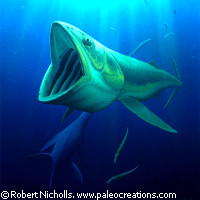Ancient fish fossils reveal whale feeding secrets
Were whales the only gentle sea giants we know today? An international team of researchers says the evolution of these marine mammals is linked to the evolution of marine organisms that made their home on Earth millions of years ago. The findings of two reports, published in the journal Science, shed light on how large, bony fish swam in the seas many millennia before whales entered into the picture. The first study, courtesy of Dr Matt Friedman from the Department of Earth Sciences at the University of Oxford in the UK and his colleagues reveals never-before-seen examples of enormous fish that travelled in the open waters before modern baleen whales, as well as some sharks and rays, made their presence known. Until now, little information was known about these ancient fish. The emergence of new fossils (previously unexamined or misidentified in museums), however, provides evidence that these filter-feeding (a method of aquatic feeding in which the animal takes in many small pieces of prey at one time) fish swam in seas around 100 million years ago during the Jurassic Period of the Mesozoic Era. Reinterpretation of old data and evaluation of these new fossils offer details about how these fish lived until the extinction event that put an end to dinosaurs and other species. According to the researchers, the ancient fish swallowed water with open mouths and filtered out food while water escaped through gill slits. Whales and other marine vertebrates that live today can thank their ancestors for developing and using the filter-feeding strategies. In the second study, researchers from George Mason University in the US and the University of Otago in New Zealand presented a key link between the diversity of organisms at the bottom of the food chain and the diversity of mammals at the top. Their results demonstrated that the evolution of diatoms (tiny, abundant algae that live in the ocean and are a staple of the whale's diet) controlled the evolution of whales after the wipe-out of the ancient filter-feeding fish. According to the researchers, the climate during that period also impacted the evolution of whales. 'This study shows that if we look at the bottom of the food chain, it might tell you something about the top,' explained Dr Mark D. Uhen from the Department of Atmospheric, Oceanic and Earth Sciences at George Mason University. 'Diatoms are key primary producers in the modern ocean, and thus help to form the base of the marine food chain. The fossil record clearly shows that diatoms and whales rose and fell in diversity together during the last 30 million years.' Dr Uhen and Felix G. Marx, a PhD student at the University of Otago, evaluated many published accounts of whale fossil records and found a strong link between whale fossils and the productivity of the ocean. 'Is it possible that the diversity of fossils we find through geological time might really just reflect the amount of preserved sedimentary rock palaeontologists can search - the more rock there is, the more fossils we find?' questioned Dr Uhen. 'This comprehensive study has shown that the diversity of these fossils is in fact not driven by the sedimentary rock record.' The researchers believe the results of their study could encourage other experts to evaluate other animals with a similar narrow ecology to determine whether this link can be interpreted likewise. Contributing to the first study were researchers from the University of Glasgow in the UK, as well as from DePaul University, Fort Hays State University, the University of Kansas, Triebold Paleontology Inc and the Rocky Mountain Dinosaur Resource Center in the US.
Countries
New Zealand, United Kingdom, United States



